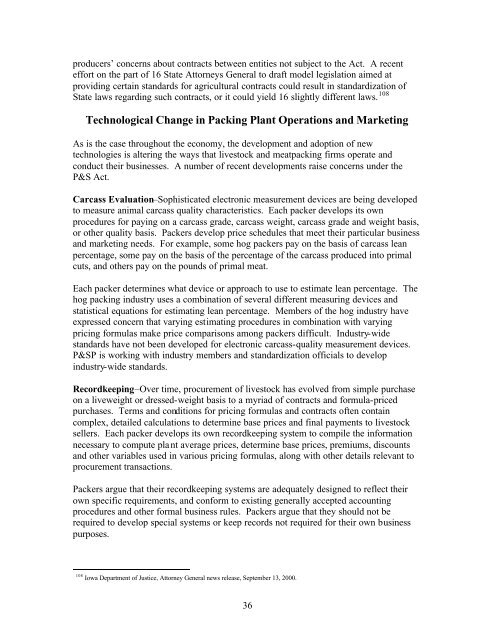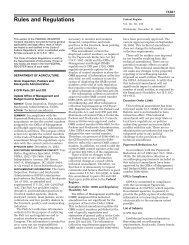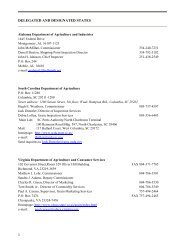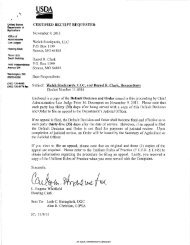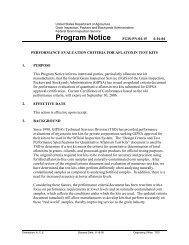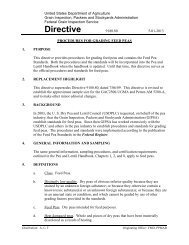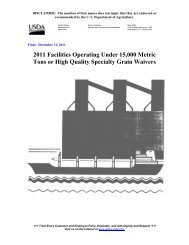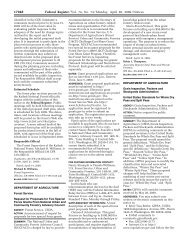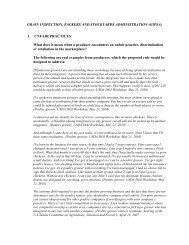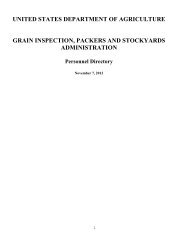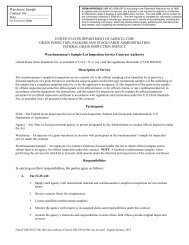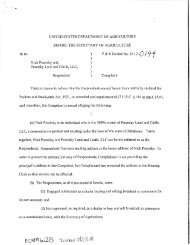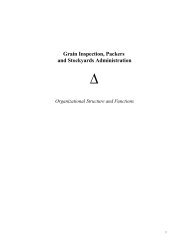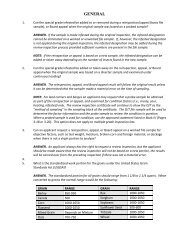Assessment of the Cattle and Hog Industries Calendar Year 2000
Assessment of the Cattle and Hog Industries Calendar Year 2000
Assessment of the Cattle and Hog Industries Calendar Year 2000
Create successful ePaper yourself
Turn your PDF publications into a flip-book with our unique Google optimized e-Paper software.
producers’ concerns about contracts between entities not subject to <strong>the</strong> Act. A recent<br />
effort on <strong>the</strong> part <strong>of</strong> 16 State Attorneys General to draft model legislation aimed at<br />
providing certain st<strong>and</strong>ards for agricultural contracts could result in st<strong>and</strong>ardization <strong>of</strong><br />
State laws regarding such contracts, or it could yield 16 slightly different laws. 108<br />
Technological Change in Packing Plant Operations <strong>and</strong> Marketing<br />
As is <strong>the</strong> case throughout <strong>the</strong> economy, <strong>the</strong> development <strong>and</strong> adoption <strong>of</strong> new<br />
technologies is altering <strong>the</strong> ways that livestock <strong>and</strong> meatpacking firms operate <strong>and</strong><br />
conduct <strong>the</strong>ir businesses. A number <strong>of</strong> recent developments raise concerns under <strong>the</strong><br />
P&S Act.<br />
Carcass Evaluation–Sophisticated electronic measurement devices are being developed<br />
to measure animal carcass quality characteristics. Each packer develops its own<br />
procedures for paying on a carcass grade, carcass weight, carcass grade <strong>and</strong> weight basis,<br />
or o<strong>the</strong>r quality basis. Packers develop price schedules that meet <strong>the</strong>ir particular business<br />
<strong>and</strong> marketing needs. For example, some hog packers pay on <strong>the</strong> basis <strong>of</strong> carcass lean<br />
percentage, some pay on <strong>the</strong> basis <strong>of</strong> <strong>the</strong> percentage <strong>of</strong> <strong>the</strong> carcass produced into primal<br />
cuts, <strong>and</strong> o<strong>the</strong>rs pay on <strong>the</strong> pounds <strong>of</strong> primal meat.<br />
Each packer determines what device or approach to use to estimate lean percentage. The<br />
hog packing industry uses a combination <strong>of</strong> several different measuring devices <strong>and</strong><br />
statistical equations for estimating lean percentage. Members <strong>of</strong> <strong>the</strong> hog industry have<br />
expressed concern that varying estimating procedures in combination with varying<br />
pricing formulas make price comparisons among packers difficult. Industry-wide<br />
st<strong>and</strong>ards have not been developed for electronic carcass-quality measurement devices.<br />
P&SP is working with industry members <strong>and</strong> st<strong>and</strong>ardization <strong>of</strong>ficials to develop<br />
industry-wide st<strong>and</strong>ards.<br />
Recordkeeping–Over time, procurement <strong>of</strong> livestock has evolved from simple purchase<br />
on a liveweight or dressed-weight basis to a myriad <strong>of</strong> contracts <strong>and</strong> formula-priced<br />
purchases. Terms <strong>and</strong> conditions for pricing formulas <strong>and</strong> contracts <strong>of</strong>ten contain<br />
complex, detailed calculations to determine base prices <strong>and</strong> final payments to livestock<br />
sellers. Each packer develops its own recordkeeping system to compile <strong>the</strong> information<br />
necessary to compute plant average prices, determine base prices, premiums, discounts<br />
<strong>and</strong> o<strong>the</strong>r variables used in various pricing formulas, along with o<strong>the</strong>r details relevant to<br />
procurement transactions.<br />
Packers argue that <strong>the</strong>ir recordkeeping systems are adequately designed to reflect <strong>the</strong>ir<br />
own specific requirements, <strong>and</strong> conform to existing generally accepted accounting<br />
procedures <strong>and</strong> o<strong>the</strong>r formal business rules. Packers argue that <strong>the</strong>y should not be<br />
required to develop special systems or keep records not required for <strong>the</strong>ir own business<br />
purposes.<br />
108 Iowa Department <strong>of</strong> Justice, Attorney General news release, September 13, <strong>2000</strong>.<br />
36


